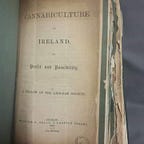Hemp Quote About Robert Emmet and Irish Rebels
By Brian Houlihan
(Please consider becoming a patron to support the creation of more unique content)
Following the positive reaction to my post about the 1916 Rising I decided to share the following find. During my research I came across this interesting quote about Robert Emmet and Irish rebels. Perhaps it can be considered both fascinating and morbid.
“If the government want to extirpate (destroy) disaffection in Ireland by the gallows, they must sow the whole island with hemp.” - Robert Southey
The words were written by the British poet Robert Southey in reaction to the death of the Irish nationalist Robert Emmet who was executed eight days previously.
Robert Emmet came from a wealthy Protestant family who were sympathetic to the plight of Irish Catholics. Emmet was part of the failed rebellions in 1798 and 1803 and was executed for his role in the latter.
The 1798 and 1803 rebellions are two of the six uprisings referenced in the proclamation read by Padraig Pearse outside the GPO in 1916.
Following the 1803 uprising Emmet was put on trial and sentenced to death. His speech from the dock inspired later generations of nationalists. One famous line from that speech is “When my country takes her place among the nations of the earth, then and not till then, let my epitaph be written.”
Emmet’s execution inspired many contemporary poets, including one who paid the following tribute. In September 1803 the poet Robert Southey wrote the following about Robert Emmet and Irish rebels.
“Had they said to him ‘Promise to plot no more and you shall be free.’ such a man would have been as safe under such promise as in the grave. If the government want to extirpate disaffection in Ireland by the gallows, they must sow the whole island with hemp.”
The latter part refers to the hangman’s rope used to hang rebels which was made from hemp. In the aftermath of the 1798 and 1803 uprisings many rebels were executed. In fact the use of hemp rope in executions continued until relatively recently.
The first execution carried out in Mountjoy prison in 1901 was with a hemp rope. In 1954 the last execution in the state under the death penalty featured a hemp rope. In both cases the rope was made from Italian hemp. Ultimately the death penalty was abolished in Ireland in 1964.
While we think of hemp for its thousands of peaceful applications, its worth remembering its use historically has not always been a peaceful one. Wars were fought using and over hemp. Napoleon Bonaparte’s invasion of Russia in 1812 was partly due to disputes over the price of hemp.
Fears over Napoleon even lead to the proposal to grow hemp in Irish bogs to fight a war against him. While once a part of wars, hemp itself has been the victim of a war, the ‘War on Drugs’. However in recent years there has been a slow return to the use of hemp across the globe.
Perhaps the Irish government could sow hemp to calm a dissatisfaction of another kind. While not a cure all for economic woes, a thriving hemp industry in Ireland could provide much needed jobs, resources and income for the state.
Maybe its time for a hemp revolution to take place.
Brian Houlihan is the curator of the Dublin Hemp Museum and regularly writes about hemp. Follow him on Twitter at @dubhempmuseum and @houlihanbrian. You can also find us on Facebook.
